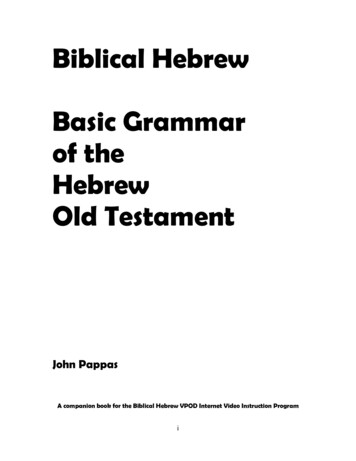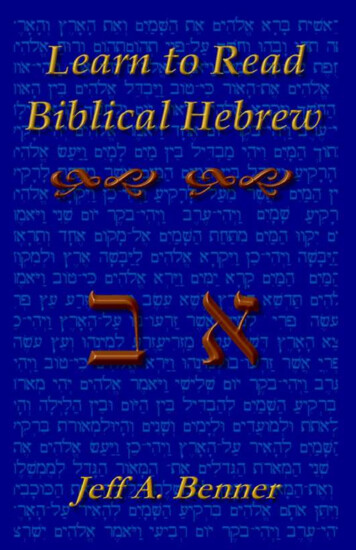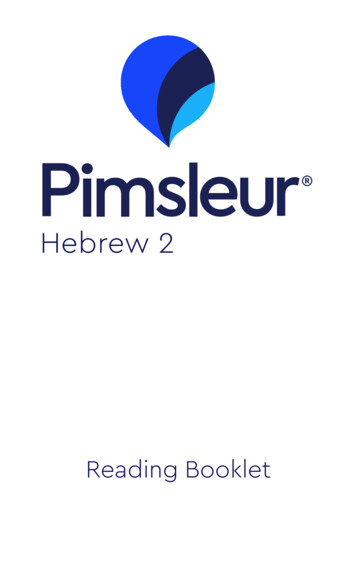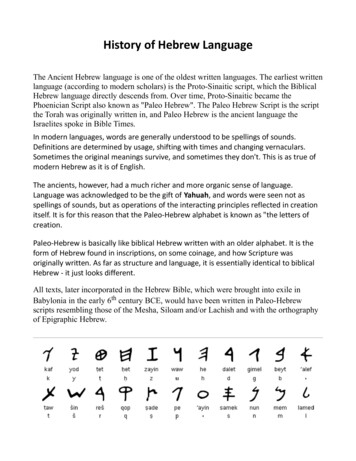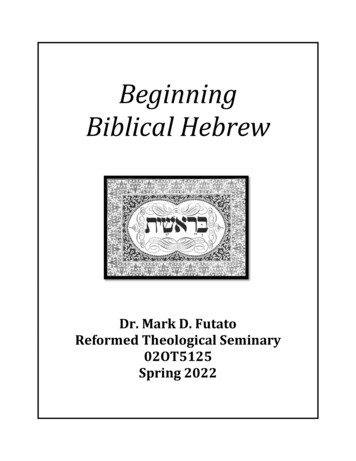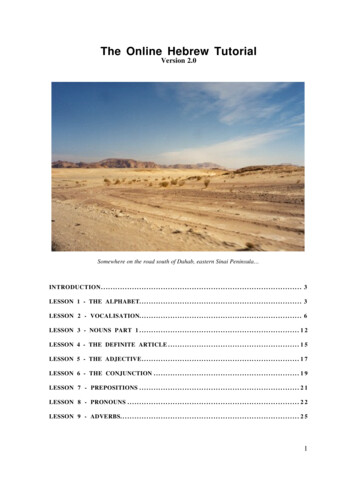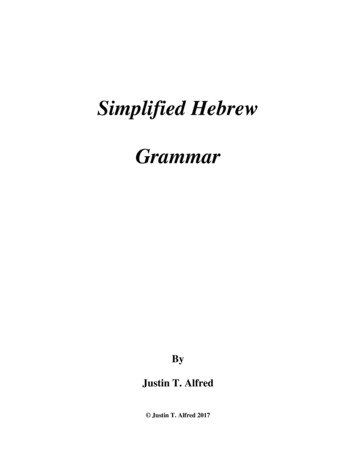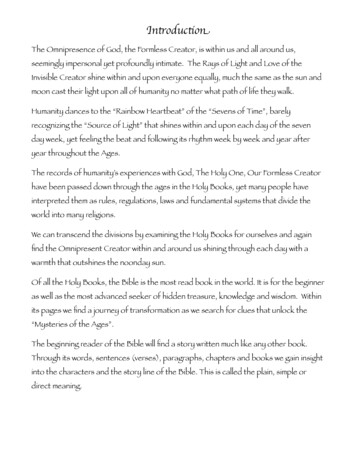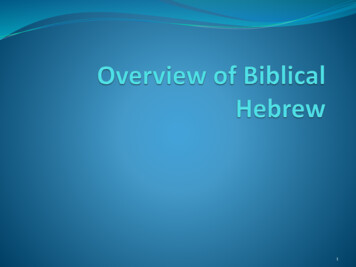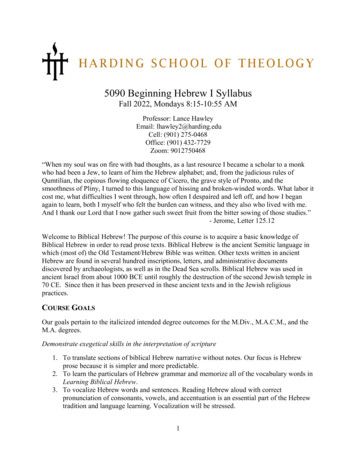
Transcription
5090 Beginning Hebrew I SyllabusFall 2022, Mondays 8:15-10:55 AMProfessor: Lance HawleyEmail: lhawley2@harding.eduCell: (901) 275-0468Office: (901) 432-7729Zoom: 9012750468“When my soul was on fire with bad thoughts, as a last resource I became a scholar to a monkwho had been a Jew, to learn of him the Hebrew alphabet; and, from the judicious rules ofQumtilian, the copious flowing eloquence of Cicero, the grave style of Pronto, and thesmoothness of Pliny, I turned to this language of hissing and broken-winded words. What labor itcost me, what difficulties I went through, how often I despaired and left off, and how I beganagain to learn, both I myself who felt the burden can witness, and they also who lived with me.And I thank our Lord that I now gather such sweet fruit from the bitter sowing of those studies.”- Jerome, Letter 125.12Welcome to Biblical Hebrew! The purpose of this course is to acquire a basic knowledge ofBiblical Hebrew in order to read prose texts. Biblical Hebrew is the ancient Semitic language inwhich (most of) the Old Testament/Hebrew Bible was written. Other texts written in ancientHebrew are found in several hundred inscriptions, letters, and administrative documentsdiscovered by archaeologists, as well as in the Dead Sea scrolls. Biblical Hebrew was used inancient Israel from about 1000 BCE until roughly the destruction of the second Jewish temple in70 CE. Since then it has been preserved in these ancient texts and in the Jewish religiouspractices.COURSE GOALSOur goals pertain to the italicized intended degree outcomes for the M.Div., M.A.C.M., and theM.A. degrees.Demonstrate exegetical skills in the interpretation of scripture1. To translate sections of biblical Hebrew narrative without notes. Our focus is Hebrewprose because it is simpler and more predictable.2. To learn the particulars of Hebrew grammar and memorize all of the vocabulary words inLearning Biblical Hebrew.3. To vocalize Hebrew words and sentences. Reading Hebrew aloud with correctpronunciation of consonants, vowels, and accentuation is an essential part of the Hebrewtradition and language learning. Vocalization will be stressed.1
Evidence a love for God and others and a personal commitment to spiritual formation4. To develop the spiritual discipline of studying biblical languages. Do not lose sight ofwhat you are learning to read – an ancient and authoritative book, a witness to God’swork among His people. Learning a language requires self-discipline, endurance,memorization, and repetition. There is no quick and easy way to learning biblicalHebrew. When you seek to learn a language for the sake of knowing God better, youdevote yourself to a discipline of the Spirit.TEXT BOOKSElliger, K. and W. Rudolph, eds. Biblia Hebraica Stuttgartensia.Kutz, Karl V. and Rebekah L. Josberger. Learning Biblical Hebrew: Reading forComprehension: An Introductory Grammar. Bellingham, WA: Lexham, 2018. Learning Biblical Hebrew Workbook: A Graded Reader with Exercises. Bellingham,WA: Lexham, 2019.COURSE REQUIREMENTS1. Quizzes (10%) – With the exception of the first week, midterm week, and final week, wewill have a quiz (total of 12 quizzes). You may take the quiz any time between classperiods. All material that we have covered prior the class is fair game, but the focus willbe on the most recent chapters from the textbook. I will clarify as we go along. I willcount your 10 best quiz grades. The quizzes are closed book and will be taken in Canvas.I expect that students will act with integrity in taking the quizzes.2. Midterm (40%) and Final (40%) – The midterm and final are cumulative andcomprehensive. Distance students need to arrange proctors for these exams. They will betaken on paper, because students may have to produce Hebrew paradigms and specifiedforms (unlike the quizzes).3. Oral Recitation (5%) – The ability to read Hebrew aloud is both an important skill and acontinuation of a venerable tradition. You will therefore be required to prepare two textsfor oral recitation, Gen 1:1-5 and Deut 6:4-9. You will perform each of these texts in thesecond half of the semester (see schedule). You may choose to memorize the text, butthis is not a requirement. A good oral reading of the Bible is available . There are also slower recordings of bothtexts in Canvas.4. Preparation (5%) – You need to attend all classes and study sessions unless you have anemergency. It is essential to your progress. Come to class having completed theassignments and ready to read the translation for the day. Practice reading the Hebrewtext aloud before coming to class.2
ADDITIONAL POLICIES AND INFORMATIONAccessibility/CommunicationHST professors are accessible to local and distance students. Please use the following to arrangeappointments with me (in person or by phone):Email: lhawley2@harding.eduCell Phone Number: (901) 275-0468Office Phone Number: (901) 432-7729The best way to communicate with me is by email. I check it often and expect you to check it aswell for class announcements and additional documents. Feel free to contact me with yourquestions any time. I will use Canvas and your Harding University email address, so please makesure to check it regularly.Credit Hour WorkloadFor every course credit hour, the typical student should expect to spend at least three clock hoursper week of concentrated attention on course-related work, including but not limited to timeattending class, as well as out-of-class time spent reading, reviewing, organizing notes, preparingfor upcoming quizzes/exams, problem solving, developing and completing projects, and otheractivities that enhance learning. Thus, for a three-hour course, a typical student should expect tospend at least nine hours per week dedicated to the course.TextbooksTextbooks can now be ordered through a link on the HST website. The Textbooks tab can beviewed on the navigation bar on any page of the website. Check the book list provided under theTextbooks tab (http://hst.edu/students/textbook-services/) for correct ISBN’s and editions toinsure correct ordering. A link provided there will take you to Amazon where you will only needto enter the ISBN to order your books.Students with DisabilitiesIt is the policy of Harding University to accommodate students with disabilities, pursuant tofederal and state law. Any student with a disability who needs accommodation should informthe instructor at the beginning of the course. Students with disabilities are also encouraged tocontact Steve McLeod, the Associate Dean, at 901-761-1353.Library ResourcesIf you have not taken 5990 (Advanced Theological Research) or took it more than a year ago, go tothe HST Web site (www.hst.edu) for information concerning library services to students. Under the“library” tab you will find a link to and instructions for searching the HST online catalog. Thereare also instructions for using the following databases available through the library: OCLCFirstSearch, EBSCOhost, Infotrac, and Religious and Theological Abstracts. Contact the library forpasswords to these databases. Also available are the research guides distributed in 5990. Theseannotated bibliographies list basic tools you will find helpful in your research.3
Academic IntegrityAcademic dishonesty in all its forms is inconsistent with Christian faith and practice, and willresult in penalties which could include a failing grade for the assignment, a failing grade for thecourse, dismissal from the course, and even dismissal from the school.Canvas Online Learning SystemIn addition to the live video platform Zoom.us (see below), this course uses Harding’s CanvasOnline Learning System, which is accessed at http://elearning.harding.edu. If you have problemsgaining access to Canvas, contact HU technical support (501) 279-4545. You will need yourHST username and your password to log into Harding Pipeline. These are the same credentialsyou use to register for classes via Pipeline.When you need to contact your professor via email, you may use the email system contained inthe Canvas learning management system, although it is best to email directly tolhawley2@harding.edu.Harding University gives each student an email address that also utilizes your user name. Manystudents use other email addresses as their preferred address. You can set your Harding G-mailaccount to forward messages to an alternative email address if you want; however, it is yourresponsibility to check your Harding email account regularly because this is the official Hardingemail address to which all Harding-related email will be sent.HST LIVE via ZOOMIn addition to Canvas (see above), this HST-Live course is supported with the video platform Zoom.us.For new Zoom platform users, go to 697-GettingStarted for helpful video tutorials about using this platform. The HST Live/Zoom Meeting ID for thiscourse is 9012750468.Students new to HST LIVE should watch the HST LIVE orientation video before the first day of class.The video can be found at uipment Requirements for LIVE Sections: Internet access using a latest version of a web browser such as Firefox (preferred). Latest version of Zoom software. This changes periodically without notification. If youalready have Zoom, use that account. Basic Zoom.us is available free. Laptop or tablet with camera or desktop computer with camera. Ear buds with microphone - Apple MD827LL/A EarPods with Remote and Mic work well.Order on Amazon.com, https://goo.gl/jLYfBG. Additional monitor – Live video conferencing is best facilitated with two monitors.4
Course Etiquette for HST Live: HST Live is a convenience for distance broadcast and attendance. In terms ofresponsibilities, it is no different than on-campus participation. Attendance is requiredjust as if in residence on the Memphis campus. Full participation in the class is expected. Please make arrangements in your ministry context or employment to be in attendancefor all calendared sessions (e.g., a staff meeting is not an excused absence). The sameapplies to arriving late or leaving early. Be seated in an environment that approximates a classroom setting (e.g., a chair at a deskin your office). Remain stationary at your computer during the class session exceptduring breaks. Arrange for your HST Live environment to be distraction free. Please do not answerphone calls during class. Failure to observe these and related etiquette matters will result in grade reductions at theprofessor’s sole discretion.Class ParticipationParticipation and collaboration are essential components of scholarship and Christiancommunity. I encourage you to volunteer answers and risk being wrong. Correction is anecessary component of learning. Participation includes:a. Attendance. The amount of contact you have with Hebrew will be directlyproportional to your success in learning the language. It is crucial for you to be inclass. Please avoid coming late and leaving early. Treat the LIVE classroom thesame as you would an on-campus classroom as far as attire and etiquette.Students are required to attend at least one of the extra one-hourhomework/review meetings each week that are led by the class tutor. Times are tobe determined.b. Preparation. Please come to class with all homework and reading assignmentscompleted. I do not expect you to get all the homework exercises correct, but I doexpect a thorough, good faith effort. Be prepared to read the text smoothly (thistakes practice).c. Vocabulary CardsYou are required to make vocabulary flash cards. Be creative with yourvocabulary studies.5
GRADING SCALEA 90-100B 80-89C 70-79D 60-69F 60PROPOSED SCHEDULE“Proposed” because we may move faster or slower, depending on the actual workload. Youshould attempt to stay a lesson ahead of the proposed schedule. If we have extra time, I reservethe right to press on ahead of the originally planned schedule. You should prepare the chaptersbefore class. You are expected to have worked through the first two lessons on your own beforethe first class.Week 1 (Aug 15) – Introduction; Lessons 1-3Before class: Read LBH 1-2, watch videos, and do exercises 1A, 1B, and 2 in workbook;memorize the consonants (names of each letter in correct order); memorize vowels (names,symbols, and sounds)During class: Review lessons 1-2, Introduce lesson 3Homework for next week:1.2.3.4.Watch video for LBH 3Do exercises 3A and 3BLearn chapter 4 vocabulary, pg. 81 in Workbook (make flashcards)Take Quiz 1: Vocab 4Week 2 (Aug 22)Review lesson 3Introduce lesson 4 – Gender and Number, Definite Article and ConjunctionHomework:1. Exercises 4A and 4B2. Chapter 4 translation (81-84)3. Take Quiz 2: Vocab 4; Lessons 1-3Week 3 (Aug 29)Review lesson 4Introduce lesson 5 – Vowel Changes in Hebrew NounsHomework:1. Exercise 52. Learn chapter 6 vocabulary (85)3. Take Quiz 3: Vocab 4-6; Lessons 1-46
Week 4 (Sept 5)Review lesson 5Introduce lesson 6 – Noun and Adjective FunctionHomework:1. Chapter 6 translation (85-88)2. Learn chapter 7 vocabulary (89)3. Take Quiz 4: Vocab 4-7; Lessons 1-5Week 5 (Sept 12)Review lesson 6Introduce lesson 7 – Constructs, Interrogatives, Prepositions, and InterrogativesHomework:1.2.3.4.Exercise 7Chapter 7 translation (90-95)Learn chapter 8 vocabulary (97)Take Quiz 5: Vocab 4-8; Lessons 1-6Week 6 (Sept 19)Review lesson 7Introduce lesson 8 – Pronominal Suffixes and Review of DefinitenessHomework:1.2.3.4.Exercise 8Chapter 8 translation (97-101)Learn chapters 9-10 vocab (103)Take Quiz 6: Vocab 4-10; Lessons 1-7Week 7 (Sept 26)Review lesson 8Introduce lessons 9-10 – Learning to Read Intuitively: Common Patterns in Hebrew Nouns;NumbersHomework:1. Chapter 9-10 translation (103-110)2. Learn chapters 11-12 vocab (111)3. Take Quiz 7: Vocab 4-12; Lessons 1-87
Week 8 (Oct 3)Review lessons 9-10Introduce lessons 11-12 – Introduction to Hebrew Verbs; Vowel Changes in VerbsHomework:1. Chapter 11-12 translation (111-115)2. Learn chapter 13 vocab (117)(Midterm Covering Lessons 1-10, vocab through chapter 12 – Take Oct 4-8 with proctor)Oct 10 STUDY WEEKWeek 9 (Oct 17)Review lessons 11-12Introduce lesson 13 – Qal PerfectsHomework:1.2.3.4.Exercise 13 verb practice sheet (37)Chapter 13 translation (117-124)Learn chapter 14 vocab (125)Take Quiz 8: Vocab 4-14; Lessons 1-12Week 10 (Oct 24)Review lesson 13Introduce lesson 14 – Qal ImperfectsHomework:1.2.3.4.Exercise 14 verb practice sheet (39)Chapter 14 translation (125-131)Learn chapter 15 vocab (133)Take Quiz 9: Vocab 4-15; Lessons 1-13Week 11 (Oct 31)Review lesson 14Introduce lesson 15 – Qal VolitionalsHomework:1.2.3.4.Exercise 15 verb practice sheet (41)Chapter 15 translation (133-140)Learn chapter 16 vocab (141)Take Quiz 10: Vocab 4-16; Lessons 1-148
Week 12 (Nov 7)Review lesson 15Introduce lesson 16 – Qal Participles and InfinitivesHomework:1. Exercise 16 verb practice sheet (43)2. Chapter 16 translation (141-148)3. Learn chapter 17 vocab (149)4. Take Quiz 11: Vocab 4-17; Lessons 1-15Week 13 (Nov 14)Review lesson 16Introduce lesson 17 – Qal Waw ConsecutivesHomework:1. Chapter 17 translation (150-159)2. Learn chapter 18 vocab (161)3. Take Quiz 12: Vocab 4-18; Lessons 1-16Nov 21 – Thanksgiving BreakWeek 14 (Nov 28)Review lesson 17Week 15 (Dec 5) – Final9
EXPLANATION OF OLD TESTAMENT CURRICULUM AT HSTThe Old Testament curriculum is designed so that students have opportunities to study most ofthe Hebrew Bible in the M.Div. and M.A. in OT degrees.M.Div. students will graduate with at least:-a comprehensive understanding of OT content (OT Survey or proficiency exam)an awareness and appreciation for critical and theological approaches to reading the OT(Adv Intro to OT)having studied the Pentateuch (Adv Intro to OT)having studied either the writings in Wisdom Literature or the prophets in Isaiaha useful ability in reading the bible in Hebrew (Hebrew I and II)In addition, the M.Div. curriculum includes elective hours for students to:-take the other English based text class (Isaiah or Wisdom Literature) not already taken forthe OT text requirementtake a third semester of Hebrew (Hebrew Readings), which qualifies students for HebrewPoetrytake Hebrew Poetry, the climactic course in the Old Testament offeringstake Old Testament World or Old Testament Theology as a general elective5000 Survey of the Old TestamentThis class is designed to familiarize students with the general content of the Old TestamentScriptures and significant themes of each Old Testament book. Successful completion of thisclass meets the requirement for the English Bible exam.Students should take this class if they want a graduate overview of the entire Old Testament. Themajority of the reading is the Old Testament. Some critical issues will be introduced, but thefocus is on the content and theology of each of the biblical books. Compare this description withAdvanced Intro to OT.5001 Advanced Introduction to the Old TestamentThis course introduces critical and theological approaches to the Old Testament through thestudy of the first five books of the Hebrew Bible, known as the Pentateuch or Torah. The classinvolves readings and discussion of critical issues, such as the formation of the Hebrew Bible,biblical historiography, and ancient Near Eastern backgrounds, and theological themes, such ascreation, covenant, and holiness. This broader focus on the message of the Hebrew Bible isgrounded in close readings of particular Pentateuchal texts.If you want a class that will cover the entire Old Testament and will require you to read the OldTestament itself at length, please take Survey of the Old Testament.10
5010 Old Testament WorldA selective study of history, cultures, languages, literatures, and religions of the ancient NearEast from 3000 B.C. to the time of Alexander that provides background for understandingancient Israel and emergent Judaism as well as for interpreting biblical text.5030 Old Testament TheologyA study of current approaches to understanding the message of the Old Testament. Selectedthemes and passages will be considered in light of their contribution to the theology of the OldTestament and its meaning for the modern world.5060 Wisdom LiteratureA study of biblical Wisdom literature — Proverbs, Ecclesiastes, and Job — in light of its ancientNear Eastern and canonical contexts. The course seeks to identify the central themes andtheological perspectives of Wisdom literature and to understand what “wisdom” means invarious literary settings.5082 IsaiahA study of the text, background, and message of Isaiah. The class also engages the issues ofprophecy, scribalism, and the religious use of the book of Isaiah in ancient Israel.5090, 5091 Beginning Hebrew I and IIThese two courses introduce the vocabulary and grammar of biblical Hebrew. Students who passthis class should be prepared to read narrative portions of the Hebrew Bible with supplementaryuse of the Hebrew lexicon.5100 Readings in the Hebrew Old TestamentThis course offers the opportunity to read narrative portions of the Masoretic Text (HebrewBible), expand Hebrew vocabulary, and learn the nuances of Hebrew syntax. Texts coveredinclude Ruth, Exodus 32-34, and 1 Kings 16-19.5130 Hebrew PoetryA study of the poetry of the Hebrew Bible, with special attention to Psalms. In addition to afocus on the form and function of biblical verse, the class addresses the historical backgroundand theological themes of particular Hebrew poems. This class requires 5100 Readings in theHebrew OT. It counts as a text class.11
1. To translate sections of biblical Hebrew narrative without notes. Our focus is Hebrew prose because it is simpler and more predictable. 2. To learn the particulars of Hebrew grammar and memorize all of the vocabulary words in . Learning Biblical Hebrew. 3. To vocalize Hebrew words and sentences. Reading Hebrew aloud with correct

